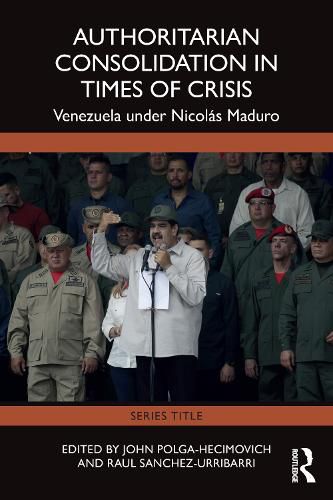Readings Newsletter
Become a Readings Member to make your shopping experience even easier.
Sign in or sign up for free!
You’re not far away from qualifying for FREE standard shipping within Australia
You’ve qualified for FREE standard shipping within Australia
The cart is loading…






Bringing together experts from across the social sciences, this volume examines the consolidation of authoritarianism in Venezuela under the government of Nicolas Maduro. Taking a comparative perspective, it explains how authoritarians can remain ensconced in power amidst profound economic crisis, widespread social discontent, low approval ratings, and international policies aimed at their removal. Moreover, it seeks to understand how the mechanisms and dynamics with which Maduro has consolidated an authoritarian regime in Venezuela. To this end, the editors differentiate the concept of authoritarian consolidation from the more studied processes of democratic erosion and democratic backsliding.
The book's contributors explore in detail the country's process of autocratization under Maduro at the national and international levels, identifying and explaining the role of diverse actors and institutions in Venezuela's political regime, and their respective contributions to safeguarding and stabilizing the Maduro administration. By offering a systematic examination of the mechanisms by which regime change was fostered under Maduro's rule, this volume directly engages with scholarly research on regime transitions and democratic collapse; democratic breakdown and the consolidation of authoritarian rule; and comparative institutional work on Venezuelan politics. The book is relevant to scholars and students of Venezuela, as well as anyone interested in the pressing question of regime crisis survival and authoritarian consolidation.
$9.00 standard shipping within Australia
FREE standard shipping within Australia for orders over $100.00
Express & International shipping calculated at checkout
Bringing together experts from across the social sciences, this volume examines the consolidation of authoritarianism in Venezuela under the government of Nicolas Maduro. Taking a comparative perspective, it explains how authoritarians can remain ensconced in power amidst profound economic crisis, widespread social discontent, low approval ratings, and international policies aimed at their removal. Moreover, it seeks to understand how the mechanisms and dynamics with which Maduro has consolidated an authoritarian regime in Venezuela. To this end, the editors differentiate the concept of authoritarian consolidation from the more studied processes of democratic erosion and democratic backsliding.
The book's contributors explore in detail the country's process of autocratization under Maduro at the national and international levels, identifying and explaining the role of diverse actors and institutions in Venezuela's political regime, and their respective contributions to safeguarding and stabilizing the Maduro administration. By offering a systematic examination of the mechanisms by which regime change was fostered under Maduro's rule, this volume directly engages with scholarly research on regime transitions and democratic collapse; democratic breakdown and the consolidation of authoritarian rule; and comparative institutional work on Venezuelan politics. The book is relevant to scholars and students of Venezuela, as well as anyone interested in the pressing question of regime crisis survival and authoritarian consolidation.